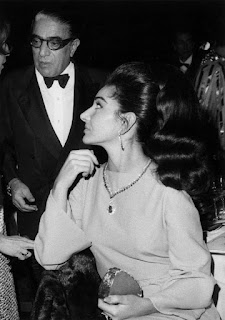
Maria Callas (December 2, 1923 – September 16, 1977) was an American-born Greek soprano who was one of the most renowned and influential opera singers of the 20th century.Her fame has transcended the usual boundaries of classical music, and she has been the inspiration for several movies as well as the successful Broadway play "Master Class."
This volatile opera diva was born Maria Anne Sofia Cecilia Kalogeropoulos in New York City to Greek émigrés. Her father set up a pharmacy and changed the family name from Kalogeropoulos to Callas. As a child Maria studied the piano. When her parents separated (she was 14 at the time), her mother returned to Athens with Maria and her sisterbecause of financial difficulties caused by the Great Depression. The budding singer was quickly accepted into the National Conservatoire where she was taught singing lessons by Maria Trivella.
She performed her first recital within the year and in 1939 won a prize for her stage debut in the Conservatoire's production of "Cavalleria Rusticana." In 1941, the soprano dramatico d'agilita made her professional debut in "Boccaccio" with the Lyric Theatre Company. While there she made a semi-name for herself with performances of "Tosca" and "Fidelio."
Her professional debut came at age 16 in a minor role in von Suppé's Boccaccio. While still in Athens during World War II, Callas sang her first Tosca in 1942. Impending war led her back to the United States in 1944 where she reclaimed the name of Maria Callas. She was offered a contract from the Met which she turned down because among the three roles she was offered to sing there was Butterfly and she believed that she was too obese to sing the fragile 14 year-old Butterfly, her friends considered her to be crazy turning down the Met while she was so unknown.
Her first appearance in 1947 at Verona as La Gioconda brought her to the attention of Tullio Serafin; Serafin became her musical advisor for many years, acting as her coach and conductor of many of her performances. The entire world of opera was stunned when, in 1949 while singing Brünnhilde in Die Walküre at Venice, she agreed to sing Elvira in Bellini's I Puritani, alternating performances during the same week.
Maria performed elsewhere (Chicago, etc.) before returning to Europe in the post-war years where she met Giovanni Battista Meneghini, a wealthy industrialist and avid opera fan. They married in 1949 and he immediately took control of her career. She reached her zenith at La Scala (1951-1958), also recording during that time. In 1956, she finally made her debut at the Met as "Norma" with performances of "Tosca" and "Lucia" following.
 |
| Maria with Onassis |
Within a couple of years her temperamental outbursts and excessive demands began to rise full force, resulting in a number of dismissals and walkouts. After meeting Greek shipping magnate Aristotle Onassis through her husband, a torrid affair erupted and her marriage ended. Maria gave up the stage in the early 1960s for the jet-set life with Onassis, but continued with occasional concerts. Despite experiencing vocal problems, she made one unforgettable comeback on stage in 1964-1965 when she toured with her personal favorites ("Norma" in Paris and "Tosca" at the Met). Weak and tired, her final curtain on stage rang down in July of 1965 in Covent Garden.
With her career over, she renounced her American citizenship and expected to marry Onassis. But their relationship was a stormy one and it eventually tapered off with Onassis instead marrying Jacqueline Kennedy in 1968. Maria was completely devastated and those around her say she never recovered. The following year she filmed an unsuccessful production of Medea (1969) and in 1971, she gave a series of masterclasses at the Juilliard School of Music in New York which were quite successful.
She came out of retirement in 1973 to tour the world with Giuseppe di Stefano in a series of recitals. Although financially rewarding, the tour did nothing to enhance her reputation. In one last comeback, she attempted a European tour of recitals but her voice completely failed her. Her last public performance was on November 11, 1975.
Riddled by sadness and despair, and by now firmly addicted to sleeping pills, Maria turned reclusive in her last year and died of a heart attack in 1977 at age 53. Despite a career that flourished less than two decades, Callas must be respected as one of the more important and recognizable opera legends. She was certainly one of the most emotive and visually dramatic. What also carries her today is, of course, her grandly turbulent and tragic image -- an Édith Piaf of opera.
(Edited
from bio by Gary Brumburgh @ IMDb & Spotify notes)





